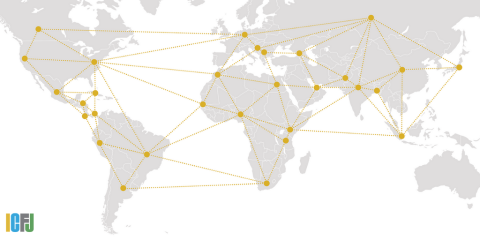
The International Center for Journalists (ICFJ) will significantly expand the services and resources it provides journalists in its unparalleled global network. In addition to offering them a wide-range of high-quality programs, ICFJ aims to continuously provide life-long learning opportunities throughout their careers.
Over 35 years, ICFJ has worked with more than 140,000 journalists from 180 countries.
“We want to ensure that these journalists are deeply engaged and continuously benefiting from their association with ICFJ and with each other,” said ICFJ President Joyce Barnathan. “With this ongoing support, they can make an even bigger impact, improving governments, economies, societies and lives through exceptional reporting.”
To help execute this initiative, Barnathan has named Patrick Butler to a new position of Vice President of Content and Community. He will coordinate activities of ICFJ’s International Journalists’ Network (IJNet), the go-to, multilingual site for journalists to learn about everything from the latest tech tips to training opportunities; the ICFJ Communications team; and a new Community Engagement group. The goal is to communicate on all ICFJ platforms the valuable resources developed for journalists — as well as to engage the community to identify their needs.
A new research division, led by Dr. Julie Posetti, will also provide insights into important trends, as well as new resources and recommendations on how best to solve today’s pressing issues for the journalism field. Senior Vice President Sharon Moshavi will oversee this expansion.

Butler, a 20-year ICFJ veteran who brings to the job years of experience on ICFJ’s leadership team, boasts a deep understanding of the vast group of journalists who have participated in ICFJ programs. As ICFJ’s Vice President for Programs, he worked with thousands of journalists, media managers, technologists and students. He formerly served as an ICFJ Knight International Journalism Fellow in Nicaragua and speaks fluent Spanish.
ICFJ also has tapped Stella Roque, a communications specialist, who formerly worked with ICFJ partner the Organized Crime and Corruption Reporting Project (OCCRP), for the newly-created position of Director of Community Engagement. OCCRP, a network of investigative journalists and independent media centers working in Eastern Europe, Central Asia, the Caucuses, Africa and Latin America, is an important partner in ICFJ’s global network.
Barnathan named Johanna Carrillo as the new Vice President of Programs. Carrillo, a native of Chile who has worked at ICFJ for 16 years, has excelled at supervising ICFJ’s media innovation and specialized reporting programs as a deputy vice president of programs. Previously, she served as ICFJ's senior program director, IJNet director, and associate producer on Televisión Nacional de Chile (TVN).
“Congratulations to all,” Barnathan said. “Stay tuned as we roll out this new plan that we feel certain will enrich the careers and expertise of journalists worldwide.”